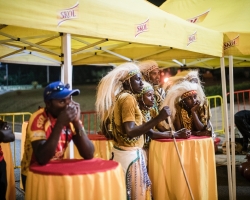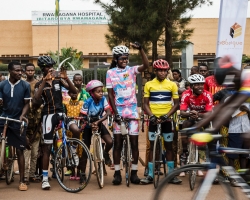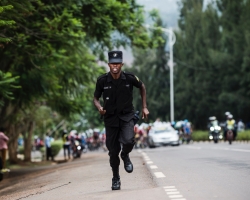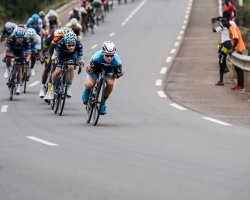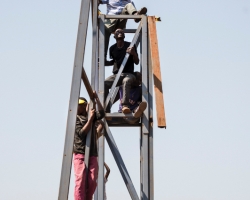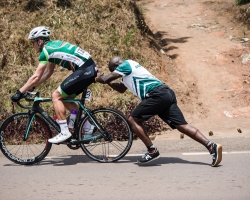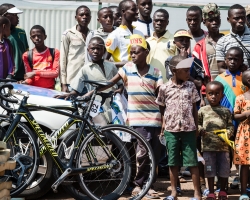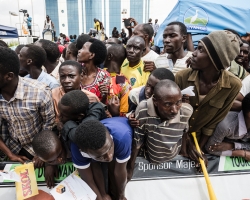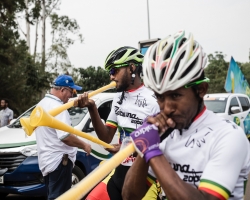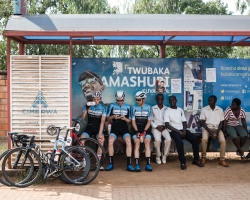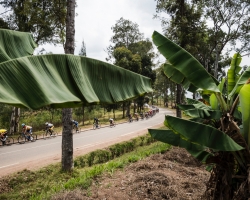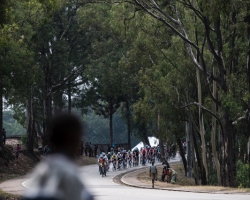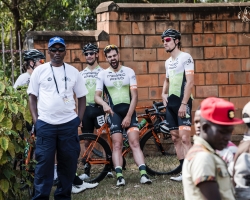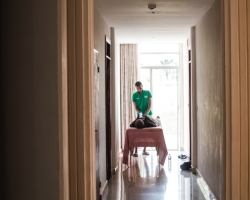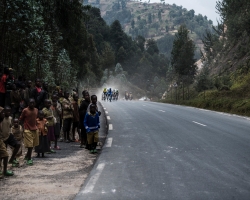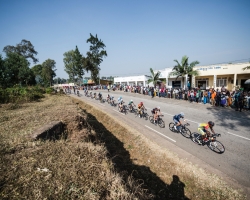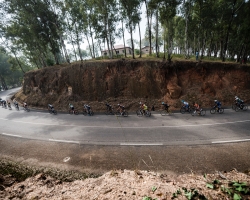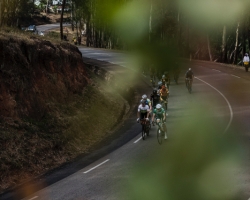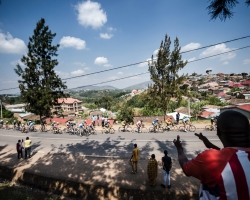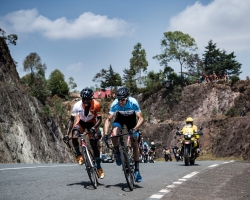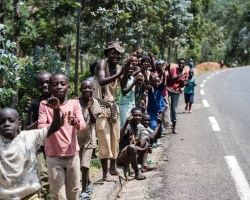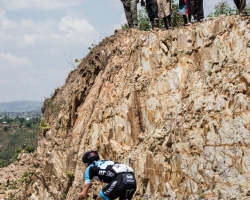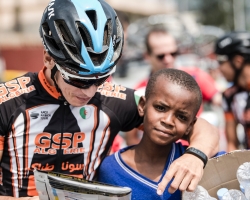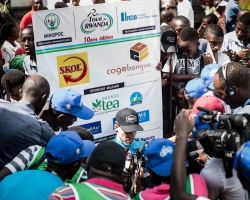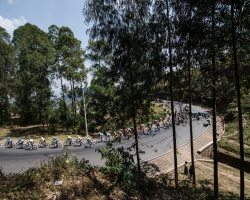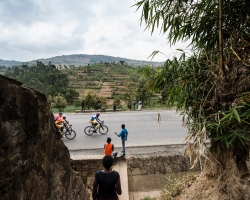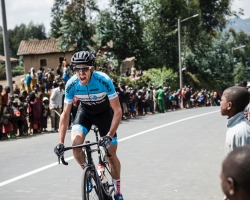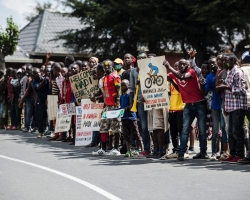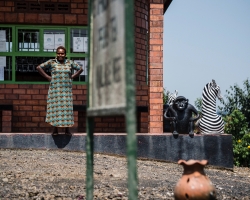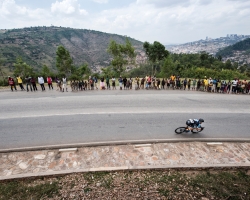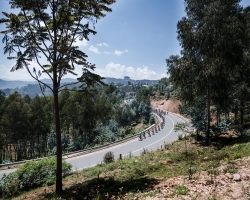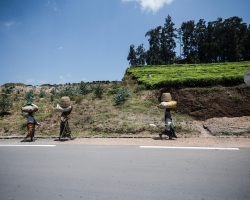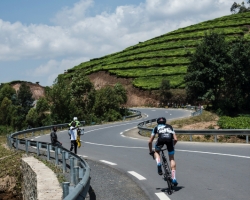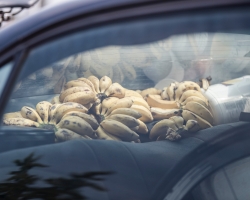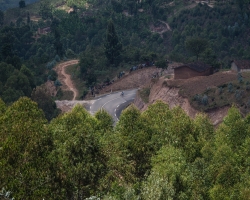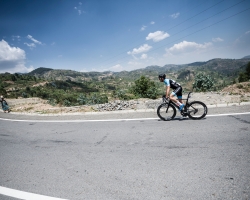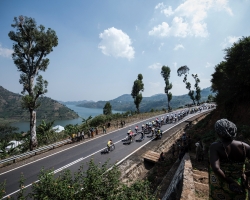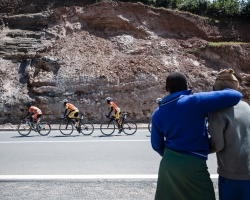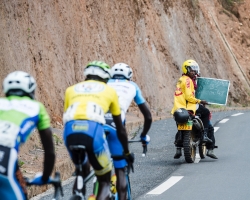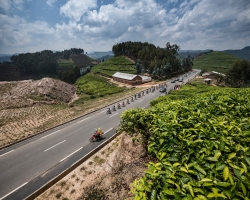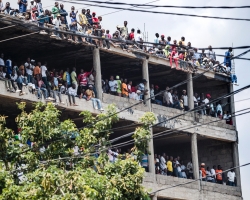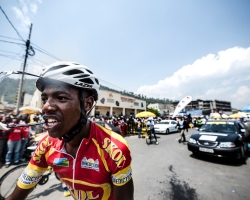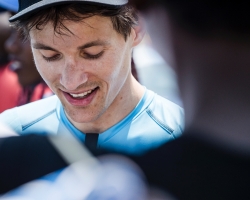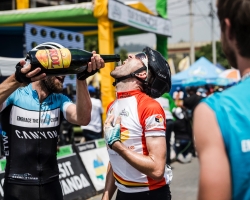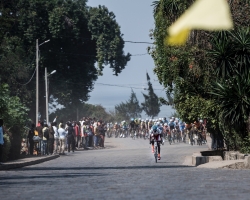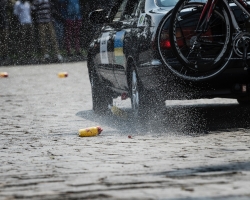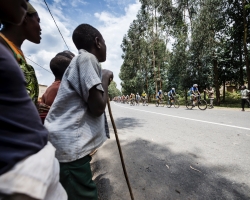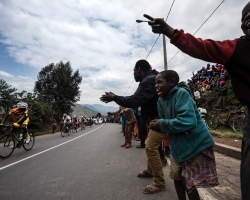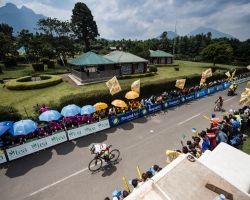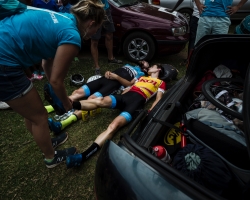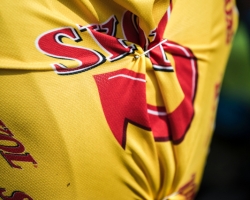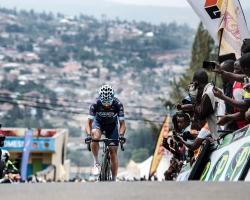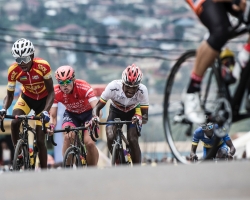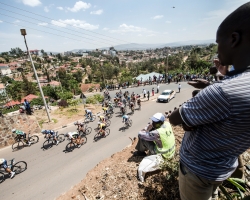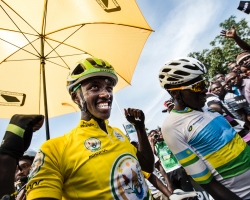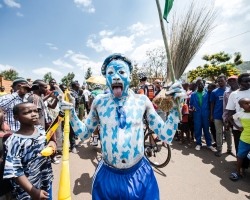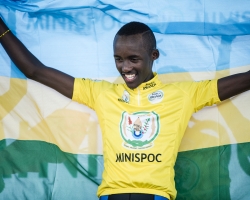Along the roadside, hundreds of spectators squint against the sun awaiting their
heroes. To pass the time, they buy peanuts and water from traveling vendors while
talking about cattle or sugarcane. Agriculture is an issue in Rwanda.
For (UCI) Union Cycliste Internationale
Text: Tom E. Laengner
Though many people slog their guts out day after day to make a living, there is an
enviable easiness perceptible. This atmosphere along the roads is also appreciated
by European tour riders. Having the ruthless treadmills of life in mind one of the
Germans had put it this way during last year’s tour: “In Germany we optimize us to
death”.
Then suddenly, the crouched figure of Samuel Mugisha comes into view. Sweating,
teeth clenched, the Rwandan wins this second stage. The twenty-year-old is riding
this year’s 10th edition of the eight-stage Tour du Rwanda, which attracted 16 teams
from 11 nations. Three of the teams were from the land of the thousand hills.
Mugisha is one of the riders the locals pin their hopes on. “On Team Rwanda we are
cyclists only,” explains the withy athlete. “There are no more Tutsis, Hutus or Twa.”
Mugisha pronounces these simple words with a penetrating look that leaves no doubt
about his clear statement. For many Rwandans it is as if the genocide of 1994
happened just yesterday. But the unity of Team Rwanda shows them that
reconciliation works. And that is something they are proud of. With a stage win, on
day two, the youngster pulls on the yellow jersey.
Most of the Rwandan riders have not been born with a silver spoon in their mouth.
Many of them have worked as bicycle taxi riders before. That’s a bare knuckle job!
Those guys haul almost everything except for bad mood. One of those union
organized riders is Isaac Ndamage. The 26 year old perceives himself as a true
bicycle man. Besides being tough it’s about pursuing the development of the
community. And this is his personal secret: “Well, I read the bible. That keeps you
open minded”. And of course he knows Adrien Niyonshuti. He has been the flag
bearer of the Rwandan Olympic National team 2012 in London. Today he is almost
as known as the president. In this year Niyonshuti finishes the Tour 24th.
Nonetheless the Rwandan is aiming for a third Olympic Games berth come Tokyo
2020.
In this friendly warm African summer there was a bunch of riders capable of winning
a tricky stage race like the Tour du Rwanda. There were not least the Ethiopians,
who had dominated the 2018 African Continental Road Championships in February.
The Rwandans Valens Ndayisenga and Jean Bosco Nsengimana, both previous
winners of their home tour, were also competing for a place on the podium.
Then there were those who came from beyond the African continent to be part of this
increasingly popular stage race. Timothy Rugg had already won the prologue and
stage three in Rwanda in 2016. Now he came back for more this year: “Against my
better judgment and knowing that it is unlikely that I could have another tour as
magical as I did in 2016!” The US American was part of the German team Embrace
the World. Incidentally, Rugg went on to win stage four and finished second in the
overall mountains classification. Rugg is in cycling for the love of the sport. And
remains differentiated noting: “Sometimes you had to use a bucket to shower. But I
believe the hospitality was bar-none anywhere I’ve ever been in the world”. Another
man who seems to lead a life he needs no vacation from.
The cheering of the spectators is hugely appreciated, particularly in villages like
Sashwara, perched at the top of a grueling climb. The riders give it their all. They
have no choice. The land of the thousand hills is a relentless uphill – downhill
sequence. Close to the home of mountain gorillas, the riders have to overcome a
difference in height of 900 meters in less than the time of half a football match.
Muscles burning, Samuel Mugisha crosses the finish line of stage six in 20th place.
For the “King of the Mountain” that was not quite what he had expected. But he
retains the yellow jersey. Almost four minutes later Adrien Niyonshuti crossed the
finish line. Mugisha refers to Niyonshuti as his mentor: “He has given me so much
and counseled me”. There surely has been a competition but no rivalry or envy. What
binds them a lot besides cycling is their experience with connected with the
genocide. During those 100 days in 1994 almost a million people have lost their lives.
Or more precisely: they had been slaughtered. The seven year old Adrien survived.
But he lost 60 of his family members. Samuel Mugisha had not been born then. But
his mother had lost her husband and her children. So she had to start all over. “The
genocide is like a scar”, explained the young talent,” people still remember what has
happened.”
Until 2008, the Tour du Rwanda was a regional cycling race. It brought together
Rwandans but also riders from neighboring countries such as Burundi, Tanzania and
Uganda. In those days Mugisha had been standing at the roadside. Sometimes it just
takes a second to change a man’s life. That was what Mugisha experienced right
then and there: “The moment I saw those cyclists was the moment my life changed”.
Since obtaining UCI 2.2 status in 2009, the stage race has become increasingly
international, and is now one of the most famous cycling events on the African
continent.
To meet UCI requirements and regulations for the race to be considered for 2.1
category, the Rwandan National Federation, FERWACY had to change the timing of
the competition to enable professional teams to participate. They will also increase
the prize money. The Federation has assured that everything is on course to start a
new era for the Rwandan cycling flagship race in 2019.
Back to the 2018 edition, the seventh stage from Musanze to Kigali packs a punch.
Mugisha tries to pedal through the pain, more determined than ever.
Pain is a familiar companion for the cyclist:”One day I stopped counting my spills.”
Cycling is suffering. You cannot be cyclists without going through incredible amounts
of pain.
The main roads are in such a good shape that some pros would lick their lips to ride
them on their European Grand Tours. Nonetheless there are roads which seem to
have a mind of their own. They refuse being paved and still present the warm red
color of East African soil. Mugisha knows them all and he respects them all. Like
many other Rwandans the athlete is deeply rooted in the hill where he has been born
and raised:”My family is here and I bear responsibility. No, I don’t want to leave.” This
penultimate stage he finishes in fourth place. Mugisha is happy to keep his yellow
jersey.
Just before the sun goes to sleep it’s the big moment of the mechanics. Close to the
equator the sun goes to sleep at about six o’clock with increasing regularity. Alex
Tibwitta maintains the bikes of the riders from Kenya. He knows how to wrap bars
fast and nicely. He checks the tire pressure before every stage and does not only
know which chain lube smells best but also which one is the best.
“The bikes have to be as fit as the riders”, the Kenyan mechanic says and with a
smile he adds: “Unlike the riders I can take my time!” Some of the teams are
modestly equipped and experienced mechanics with high ambition and the ability to
improvise are highly welcome. And while the riders enjoy ice cooled soft drinks,
omelets, beans or cassava Tibwitta is still fiddling about the bikes.
Then his mind was wandering to tomorrow’s last stage.
While the cobble stones of the “Hell of the North” are legendary in European cycling,
those of the “Wall of Kigali” are on their way to achieving similar status in Africa. This
year they spiced up the queen stage of the tenth edition of the Tour du Rwanda. For
a few riders it seems to be hassle free. But for the majority this is definitely not the
case. After six stages and more than 900 kilometers, a road with an ascent of twelve
percent becomes a wall. But walking the bike is not an option… at least not a serious
one. For Thokozani Mahlangu from Team Sampada it looked like a rebirth. Just a
couple of days ago the South African was robbed and held at gunpoint after training.
The muggers stole his phone, the money he had on him and even chips and biscuits
Mahlangu had just bought for his children. Though he finishes the stage 50th, his
bright smile on the steep road made clear: here was a guy who had overcome a
tragic event in his life.
Having finished the Tour, Adrien Niyonshuti visits the Kigali Genocide memorial. It is
not a routinely act of duty. Niyonshuti comes here on a regular basis to be close to
his family. They are among the 250.000 people, who are buried here in a mass
grave. But until today not all members of his family have been found. It’s not only this
which causes him nightmares. What he has been trough as a young boy probably
was not less than hell. And it is still haunting him.
Efficiently supported by the Rwandan team, Mugisha holds strong on the last day
and wins the overall classification of the 2018 Tour du Rwanda. The crowd starts
cheering and dancing. And though it was a sunny Sunday the carpenters,
hairdressers and retailers along the Kwa Mutwe resume their work. And the boys
wearing flip-flops do what matters most for them. They play football. Again at last.
